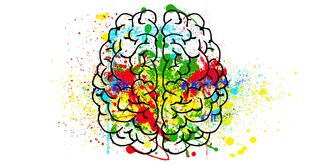ADHD
The Gift of ADHD
Neurodivergence and the benefits of Attention-Deficit Hyperactivity Disorder.
Posted April 4, 2022 Reviewed by Tyler Woods
Key points
- ADHD can be a challenging diagnosis and oftentimes medication is used to manage symptoms.
- Paradoxically, there are many benefits to ADHD symptomatology that are oftentimes overlooked.
- Several non-medication alternatives can also be effective in managing symptoms.

Unable to sit still, excessive talking, needing constant redirection, interrupting, forgetfulness…these are just some of the symptoms used to describe struggles with ADHD, attention-deficit hyperactivity disorder.
For decades, parents and adults themselves with ADHD have struggled to manage these symptoms, which often expose significant difficulties with functioning in school, work, and interpersonal interactions. Often a misunderstood, misdiagnosed, and overmedicated condition, ADHD has a side that is less often spoken of. In these struggles lie significant strengths that, if harnessed with the appropriate environment, have the potential to be gifts.
First, it’s important to distinguish between clinical ADHD and ADHD symptomatology. To say someone struggles with ADHD symptomology is not the same as carrying an ADHD diagnosis. Many individuals present with some symptoms that do, in fact, make it more challenging to focus, sit still, or make deadlines, yet are also medicated. Unfortunately, more often than not, these are also the individuals who experience increased negative side effects. Parents often complain that their child is "zombie-like," not eating, having trouble sleeping at night, or anxious. Some of these side effects present as a result of the body’s systemic struggle to metabolize the medication given, typically methylphenidate. What if we didn’t suppress these symptoms but instead "worked with them," or even encouraged them?
Benefits of ADHD Symptoms
There is significant research that suggests individuals with ADHD are superior in creative cognition, divergent thinking, conceptual expansion, and overcoming knowledge constraints (White, 2019). For example, individuals with ADHD show the increased ability to think divergently, or think of many ideas from a single point, as well as to create, invent, and innovate. Further, Healey and Rucklidge (2006) examined the relationship between creativity and ADHD symptoms and found that 40 percent of the creative children tested displayed clinically elevated levels of ADHD symptomatology, but none met the full criteria for ADHD. Exposing children who struggle with ADHD symptomology to creative environments, whether that be art, music, or inventive/creative outlets, may help facilitate not only new hobbies but also help promote focus.
Sports Performance
Undoubtedly, one of the greatest struggles parents associate with ADHD symptomology is the hyperactive component. Individuals who struggle with ADHD or ADHD symptomology often struggle with excess levels of energy. Often, this hyperactivity or energy is suppressed by medication. However, it’s this exact high level of energy that can also improve sports performance. Sports such as martial arts, swimming, track and field, and ballet/dance/gymnastics may be particularly helpful for individuals struggling with ADHD symptomatology, as these sports focus on mastery while allowing an appropriate energy outlet. Numerous professional athletes are amongst those struggling with ADHD, most notably Michael Phelps (Olympic swimmer), Justin Gatlin (Olympic runner—track and field), and Simone Biles (Olympic gymnast) to name a few. In fact, Dutton (2021), states that an estimated eight to ten percent of all pro athletes struggle with ADHD/ADHD symptomology, as compared to four to five percent of the general population of adults.
Entrepreneurship
Perhaps one of the most impressive statistics comes from Garret Loporto and the Davinci Method: those struggling with ADHD are over 300 percent more likely to start their own business, compared to those who do not struggle with ADHD or ADHD symptomology. The need and desire for autonomy, struggles with ‘traditional’ deadlines and organization, and the leeway in designing work make entrepreneurship and business ownership particularly desirable. According to Wiklund et. al (2017), inattention is negatively associated with successful entrepreneurship, but hyperactivity is positively associated. Further, sensation seeking and lack of premeditation generally positively influence entrepreneurship due to the risk-taking nature needed in building many businesses. Similarly, children should be encouraged to facilitate entrepreneurial skills such as problem-solving, negotiation, product creation, and experimentation. For example, children or adolescents can be encouraged to earn money through mowing lawns, shoveling driveways, selling items online, or coaching/mentoring peers.
Alternative Considerations
Although medication is an appropriate treatment option for those diagnosed with ADHD, these additional treatment modalities may be just as beneficial. The following considerations may assist with symptom alleviation while working with, not against, systemic brain chemistry.
Therapy/ADHD Coach
Providing either therapeutic services or mentoring services to teach organizational skills, focus, deadline expectations, and healthy outlets for energy is an excellent tool for the management of ADHD symptomology. Additionally, providing validation and support regarding the struggles associated with ADHD aids in understanding and creating universality. Many children and adolescents report feeling misunderstood or alone regarding their struggles, and providing them an open/nonjudgmental environment that provides safety and encourages vulnerability.
Neurofeedback
Neurofeedback is a method of self-training the brain to increase or decrease a particular brainwave. Many individuals struggling with ADHD have lower than typical levels of beta, and higher than typical levels of theta brainwaves. Beta/Theta training has been considered to be effective in self-regulating the brain by increasing the level of beta brainwaves produced and subsequently decreasing the amount of theta production.
Vitamins/Minerals
According to Duff (2013), foods rich in zinc, copper, magnesium, selenium, and vitamin D have all been linked to improvements in ADHD symptomology. Specifically, several studies have associated low zinc status with symptoms of ADHD. Children with the inattentive type of ADHD have been shown to have significantly lower levels of zinc and ferritin and children with the hyperactive type have significantly lower levels of zinc, ferritin, and magnesium (Duff, 2013).
In Conclusion
Perhaps a greater understanding of ADHD and ADHD symptomology can allow one to create an adaptive environment. Medication can be an appropriate option for some, but "encouraging" ADHD symptoms to use as personal strengths can be beneficial as well.
References
American Psychiatric Association. (2022). Diagnostic and statistical manual of mental disorders: DSM-IV-TR (5th ed: text revision). Washington: American Psychiatric Association.
Duff, J. (2013). Nutrition for ADHD and Autism. Journal of Clinical Neurotherapy: Application of Techniques for Treatment. DOI: 10.1016/B978-0-12-396988-0.00014-3
Dutton, Judy (2021). On Your Mark, Get Set, Glow: 3 Inspiring Athletes With ADHD. Attitude: Inside the ADHD Mind.
Healey, D., & Rucklidge, J. J. (2006). An investigation into the relationship among ADHD symptomatology, creativity, and neuropsychological functioning in children. Child Neuropsychology, 12(6), 421-438.
White, Holly. 2019. The Creativity of ADHD. Scientific American.
Wiklund, J., Y., Wei, Tucker, R., Tucker, R., & Marino, L. (2017). ADHD, impulsivity and entrepreneurship. Journal of Business Venturing, 32, 627-656.




